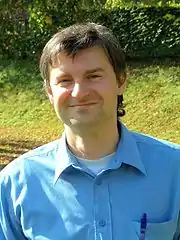
Joachim Grzega (born 9 September 1971 in Treuchtlingen) is a German linguist. He studied English and French at the Catholic University of Eichstätt-Ingolstadt, University of Utah in Salt Lake City, Paris-Sorbonne University and the University of Graz. He has taught since 1998 at the Catholic University of Eichstätt-Ingolstadt.[1] Grzega obtained his doctorate in 2000 in Romance, English and German linguistics. He obtained his habilitation (i.e. post-doctoral degree) in 2004. Professor Grzega has held interim or guest professorships in Münster, Bayreuth, Erfurt, Freiburg, and Budapest.
His focus is on onomasiology, eurolinguistics, intercultural communication, teaching of English as a lingua franca, language teaching in general and the role of language and communication in the transfer of knowledge. He also developed the Basic Global English (BGE) system for English teaching.[2][3][4][5] With Onomasiology Online (Onon), he created one of the first peer-reviewed free access German linguistics journals. His second journal is specially dedicated to the relatively young branch of eurolinguistics: Journal for EuroLinguistiX (Jelix). He is also involved in the field of university-level language teaching, particularly in the development and dissemination of the Learning by teaching model founded in the 1980s by Jean-Pol Martin.[6]
Works
- Grzega, Joachim (2011). Hello World! Teacher Handbook Basic Global English. ISBN 9783842379725.
- Grzega, Joachim (2011). Introduction to Linguistics from a Global Perspective: An Alternative Approach to Language and Languages. ISBN 9783862880669.
- Grzega, Joachim (2001). Romania Gallica Cisalpina: Etymologisch-geolinguistische Studien zu den oberitalienisch-rätoromanischen Keltizismen. ISBN 9783110944402.
- Grzega, Joachim; Schoner, Marion (2008). "The didactic model LdL (Lernen durch Lehren) as a way of preparing students for communication in a knowledge society". Journal of Education for Teaching. 34 (3): 167. doi:10.1080/02607470802212157. S2CID 59268569.
- Grzega, Joachim (2002). "Some aspects of modern diachronic onomasiology". Linguistics. 40 (5). doi:10.1515/ling.2002.035.
- "Developing More than Just Linguistic Competence — The Model LdL for Teaching Foreign Languages" (PDF).
{{cite journal}}: Cite journal requires|journal=(help) - Grzega, Joachim (2003). "On using (and misusing) prototypes for explanations of lexical changes". Word. 54 (3): 335–357. doi:10.1080/00437956.2003.11432537. S2CID 141822988.
- "The Role of English in Learning and Teaching European Intercomprehension Skills" (PDF).
{{cite journal}}: Cite journal requires|journal=(help)
References
- ↑ "Niederländisch lernen in acht Stunden" [Learn Dutch in eight hours]. Augsburger Allgemeine. 29 January 2018.
- ↑ "Simple English: Sag es auf gut Globalesisch!" [Simple English: Say it in good Global!]. Spiegel Online. 27 March 2008.
- ↑ Schmundt, Hilmar (31 March 2008). "Fremdsprachen: Die Kunst des Stammelns" [Foreign Languages: The art of stammering]. Spiegel Online.
- ↑ Schmundt, Hilmar (1 April 2008). "Fremdsprachen: "Globales Englisch ist eine Grundfähigkeit wie Autofahren"" [Global English is a basic skill like driving a car.]. Spiegel Online.
- ↑ Hitchings, Henry (6 November 2011). "What's the language of the future? As English takes over the world, it's splintering and changing — and soon, we may not recognize it at all". Salon.
Joachim Grzega, a German linguist, is promoting Basic Global English, which has a mere twenty grammatical rules and a vocabulary comprising 750 words that learners are expected to supplement with an additional 250 words relevant to their individual needs.
- ↑ Heinrich, Christian (November 2007). "Learning by Teaching: The Goal is Independence". Goethe-Institut.